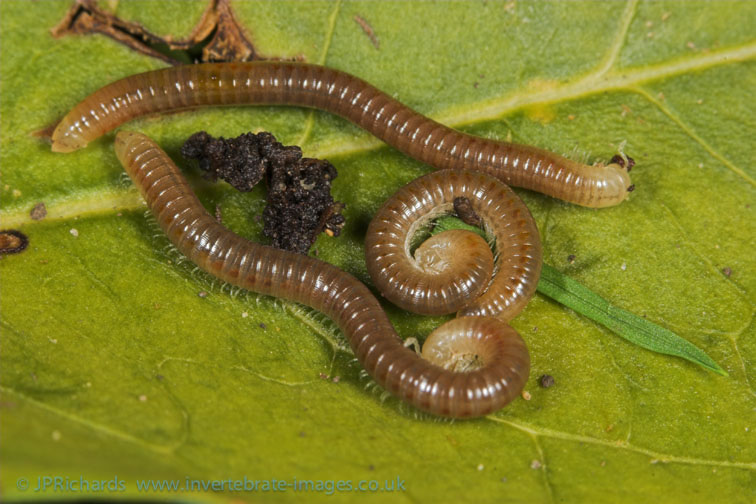Cylindroiulus vulnerarius (Berlese, 1888)
Status:
- GB IUCN status: Not applicable (non-native)
- GB rarity status: Naturalised
ID Difficulty
Identification
This pallid species, with orange ozadenes, is readily identified among the British and Irish Julidae (except the very rare Metaiulus pratensis) in completely lacking ommatidia (eyes). However, on occasions it has been confused with Blaniulidae, such as Blaniulus guttulatus, which are considerably more slender and lack dorsal body striae.
Distribution
This species was collected in Britain for the first time in 1975 and in Ireland in 1978. Since then it has been recorded occasionally from approximately twenty, mainly urban sites across Britain and Ireland. As Gregory & Campbell (1996) reported from Oxford, the millipede may be abundant where it is found.
C. vulnerarius is supposedly endemic to Italy. It has been widely introduced into synanthropic habitats in northern Europe, especially in Belgium and the Netherlands but also in France and Sweden (Kime, 1999). However, its recent discovery in a cave raises the possibility it may be a relict species in Belgium (Kime, 2004).
Habitat
Analysis of the recording scheme habitat data suggests that this species is strongly synanthropic. It is particularly associated with glasshouses, gardens, parks and other open spaces in urban areas. Kime (2004) considered its habitat to be rotting wood and other decaying organic matter in contact with the soil.
Phenology
Bilton (1990) monitored populations of this species at two sites in Oxford and found it active close to the soil surface between November and April only. He also found animals kept in captivity were surface active at night. Adult animals have been collected from October through to June. The apparent absence of adults in the summer may indicate that both sexes die after reproduction but as the total number of records of this species is so small it is still possible that adults will be found in July and August.
This species account is based on Lee (2006).
Links
MilliBase - Global catalogue of Millipedes: https://millibase.org/aphia.php?p=taxdetails&id=1024823








